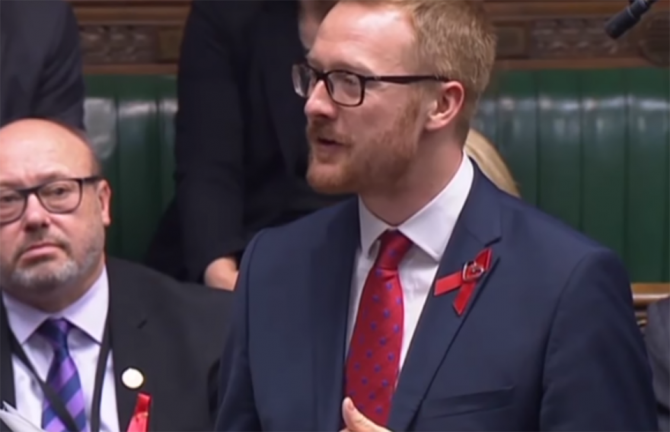

Feature Story
Stigma makes HIV life-threatening
25 February 2019
25 February 2019 25 February 2019“If I am meant to be a leader, I needed to be truthful,” said Lloyd Russell-Moyle, British Member of Parliament, reflecting on his bold move to reveal his HIV-positive status in the House of Commons in late November 2018, days before World AIDS Day.
He explained that for years he would honour people for their outstanding work in the HIV field and yet he never opened up and was honest with people about living with HIV.
“The more people don’t talk about it, the harder it is for everyone. As a Member of Parliament my job involves speaking out, being an advocate and helping people in their journey,” Mr Russell-Moyle said.
In his speech to the House of Commons, he described the sense of fear he had when he learned that he was living with HIV nearly 10 years ago. In his view, there is internal stigma, which kept him from speaking about his status for fear of “spreading” what used to be a deadly disease and the fear that people may reject him if they knew he was living with HIV.
“All that stigma makes a treatable disease life-threatening due to the impact on an individual’s mental health and access to medication,” he said in his emotional 28 November speech. In a telephone interview with UNAIDS, he specified that, “In no way should we glorify HIV, but it is liveable and manageable.” And living with HIV should not hold anyone back in any way, shape or form, he stated.
He desperately wants people to understand HIV better. “I want to get to the stage where I don’t have to explain that if you take one pill a day, you [have a viral load that is] undetectable and if you become undetectable you cannot pass the virus on to anyone,” he said.
That’s why, with the leading British association representing professionals in HIV care, BHIVA, Mr Russell-Moyle wants to reform certain laws. One European Union law forbids people living with HIV from obtaining a full pilot licence.
“It’s outdated considering that HIV treatment now involves a pill a day with no side-effects,” he said.
He also has been vocal about the British Government’s public health spending cuts. “We are at a crossroads right now, having made so much progress,” Mr Russell-Moyle said. “We are in danger of lifting our foot off the pedal so close to the finish line.”
Not funding vaccine research and reducing sexual health screening and prevention will cost the government in the long run and ruin lives, he predicted. “It’s a race against the disease, and if we slow down at this stage we will likely see a rebound,” he said.
According to Public Health England, 12% of people living with HIV in England are unaware of their diagnosis. A Brighton-based foundation launched a Making HIV History campaign to improve knowledge and encourage people to come forward for testing—Mr Russell-Moyle noted that the Stigmasaurus video animations were a great tool to correct stereotypes.
“We have got the drugs, the tools to allow everyone to live happily, so for those who don’t know their status: get tested, get treatment, it will be okay.” He concluded, “It is okay.”



